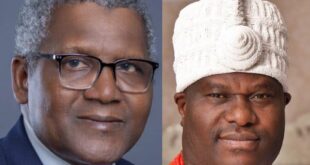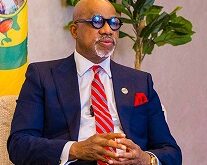… Condemned Fidelity’s Actions As “A Deliberate Disregard” For Authority Of Courts
The Supreme Court of Nigeria has directed Fidelity Bank Plc to pay ₦225.3 billion in damages to Sagecom Concept Limited, a company based in Ibadan.
The ruling stems from a long-standing legal dispute over the sale of contested properties.
Reports indicate that Fidelity Bank has opened negotiations with the legal team representing Sagecom Concept Ltd to arrange a structured repayment plan for the enormous court-ordered judgment.
However, sources warn that the urgency of the Supreme Court’s directive may restrict the bank’s ability to stagger payments, raising the specter of a solvency crisis.
A senior bank official described the development as Fidelity Bank’s most severe challenge to date. “This is the biggest crisis the bank has ever faced,” the source said during a weekend video call, as reported by People’s Gazette.
The official added, “The obligation is simply too big. If the bank survives this, it will be thanks to the goodwill of the small business that won this unprecedented judgment.”
The insider, who spoke anonymously, revealed that the ruling has shaken the bank’s top management to its core.
Despite recording a 140% stock price increase this year and closing at ₦20.80 per share recently, Fidelity Bank’s financial position remains under scrutiny.
Although the bank declared ₦385 billion in pre-tax profits for 2024, insiders admit a significant portion is tied up in rolled-over loans – raising doubts about its capacity to fulfill the ₦225 billion obligation.
A source familiar with Nigeria’s banking system suggested that the Central Bank of Nigeria (CBN) may have to step in to stabilize the sector and prevent the collapse of a Tier-1 bank in an already fragile economy.
Fidelity Bank and its legal team, including notable senior advocates Kanu Agabi and Onyechi Ikpeazu, have declined to comment publicly on the judgment or ongoing negotiations.
It would be recalled that the legal dispute dated back to loans obtained by engineering firm G. Cappa Plc from FSB International Bank in the early 2000s – one valued at $3 million and the other at ₦100 million. These loans, which came with high interest rates, became part of Fidelity Bank’s portfolio after it acquired FSB and its liabilities during the 2005 banking sector consolidation.
Following alleged defaults by G. Cappa, Fidelity began seizing collateral assets located in Ikoyi and Ibadan. This was despite a federal court order instructing the bank not to proceed with asset sales. Fidelity allegedly ignored the injunction and went on to sell some of the properties to Sagecom Concept Ltd for ₦350 million.
Sagecom, co-founded by Bamidele Ogunkanmi and US-based Dakore Miriki, later discovered a 2006 court-issued disclaimer that prohibited the sale of the properties. The firm initiated legal action to recover its investment, citing the breach of the court’s original injunction.
The legal battle, which moved through the Lagos High Court and the Court of Appeal, reached the Supreme Court in 2018. On April 11, 2025, a panel of five justices unanimously ruled in Sagecom’s favour.
Justice Adamu Jauro, who delivered the lead judgment, stated, “Allowing the appellant to escape liability as it so desperately seeks would be tantamount to allowing it to benefit from its own wrong.”
Justice Jummai Hannatu Sankey, in a concurring opinion, condemned Fidelity’s actions as “a deliberate disregard” for both the authority of the courts and the rights of Sagecom.
The Supreme Court concluded that there had been no miscarriage of justice in the lower courts’ decisions and upheld their rulings.
The Lagos High Court had originally ruled in 2011 that Fidelity owed compensation to Sagecom for lost rental income due to the illegal sale. Justice Olabisi Akinlade recently revised the award to reflect current market values: $139 million or ₦225.3 billion, using the prevailing exchange rate of ₦1,620 per dollar as of May 15, 2025.
Fidelity Bank, currently under the leadership of its first female CEO, Nneka Onyeali-Ikpe, is Nigeria’s sixth-largest bank by assets.
The bank has often faced criticism for its aggressive loan recovery methods. But Fidelity attributed its firm loan practices to regulatory pressure from the CBN.
 Startrend International Magazine For Your Latest News And Entertainment Gists
Startrend International Magazine For Your Latest News And Entertainment Gists





